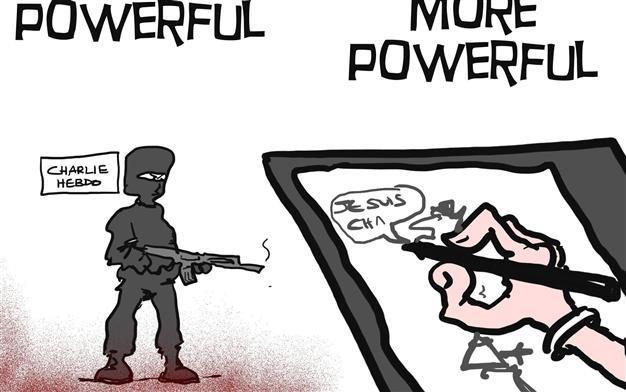Cartoonists put pen to paper in solidarity with Charlie Hebdo
PARIS - Agence France-Presse

A cartoon tribute drawn by MacLeod was released in solidarity with those killed in an attack at the Paris offices of the weekly newspaper Charlie Hebdo after masked gunmen stormed their offices, Jan. 7. AP Photo / MacLeod Cartoons
Cartoonists and writers from around the world are reacting as they know best - by putting pen to paper - in an outpouring of anguished and biting solidarity with those gunned down at French weekly Charlie Hebdo.Fellow satirists stood up for the right to lampoon whatever they choose as editorialists said Wednesday's attack, which left 12 dead including some of France's best-known cartoonists, targeted the heart of press freedom and democracy.
Among the cartoons that went viral online was one by Australia's David Pope: a picture of a gunman with a smoking rifle standing over a body, bearing the caption "He drew first".
"Ultimately people who carry out these attacks can't defeat ideas through these means and they won't succeed," Pope wrote, adding that he had once met a cartoonist involved in the shooting and that the attack "hit a nerve".
"Our task is to keep doing what we do... focus our satire on those in power and those who seek to wield power in ugly ways like these gunmen and be part of a movement that promotes social solidarity, a free and open and tolerant society."
South African cartoonist Zapiro said he hoped the attack "doesn't have a further chilling effect on satirists, commentators and journalists; any free thinkers in society."
"But I'm afraid that scenario is probably inevitable."
Like Charlie Hebdo, Zapiro, whose real name is Jonathan Shapiro, has drawn condemnation for daring to draw cartoons poking fun at the Prophet Mohammed.
The Financial Times was one of the few to criticise Charlie Hebdo and faced a backlash after publishing an opinion piece by its European editor that called the weekly "stupid" and "foolish."
In an online article, Tony Barber condemned the attack, but accused the satirical weekly of "editorial foolishness" and said that it had "just been stupid" to provoke Muslims with its Mohammed cartoons.
"Some common sense would be useful at publications such as Charlie Hebdo, and Denmark's Jyllands-Posten, which purport to strike a blow for freedom when they provoke Muslims," he wrote.
Flemming Rose, the Danish editor at Jyllands-Posten who triggered global protests in 2005 by publishing cartoons of Mohammed, said that Charlie Hebdo was defending press freedom.
"Charlie Hebdo didn't shut up... and they have now paid the highest price for that," Rose said.
Among the news outlets choosing to show their solidarity by running Charlie Hebdo cartoons was Spanish monthly Mongolia.
"Today we are all #CharlieHebdo and we back freedom of expression," Mongolia's editor, Gonzalo Boye, said.
The Instagram account attributed to mysterious British graffiti artist Banksy bore a cartoon of a pencil under the word "yesterday", the same pencil snapped in two under "today", and a third with the stub of the pencil, once again sharpened, under the line "tomorrow."
It bore the simple caption "RIP." Many editorial pages were similarly outraged by the attack, insisting that the killings should not undermine press freedom.
France's media erupted in fury, with the daily Liberation running the headline 'We are all Charlie" - a line repeated in many other papers and echoed online with the hashtag #JeSuisCharlie.
Le Parisien went with "They will not kill liberty" while Les Echos called for people to face up to "barbarism", publishing the last cartoon written by one of those killed in the attack.
"The hooded bastards declared war on France, on our democracy, on our values," the paper said in an editorial.
The attack "targeted the heart of democracy -- the freedom of the press", wrote German daily Frankfurter Allgemeine Zeitung, adding in an opinion piece that the gunmen must not be allowed to win.
"We cannot allow men with Kalashnikovs and rocket-propelled grenades to determine what we should say, write, draw and even think," it said. That "would spell the end of the free and open society."
Britain's press called for a measured response, fearing the rise of Islamophobia and the far right.
Both the Daily Mail and Daily Telegraph ran with the front-page headline "The War on Freedom" while The Guardian leapt to the defense of Charlie Hebdo, saying there was something "distinctly French about the form of offensiveness" it revelled in.
The Times also defended the right to criticise Islamists, but warned that French President Francois Hollande may find himself under pressure from the far right to "fight fire with fire."
The Sydney Morning Herald's executive editor of photography and presentation, Matt Martel, said the paper had decided against running a cartoon showing the Prophet Mohammed in response.
"We shouldn't be scared into self-censorship, but neither should we use it as an excuse to incite or vilify."
















